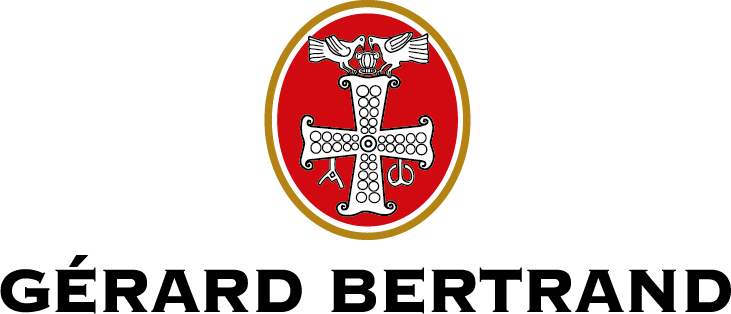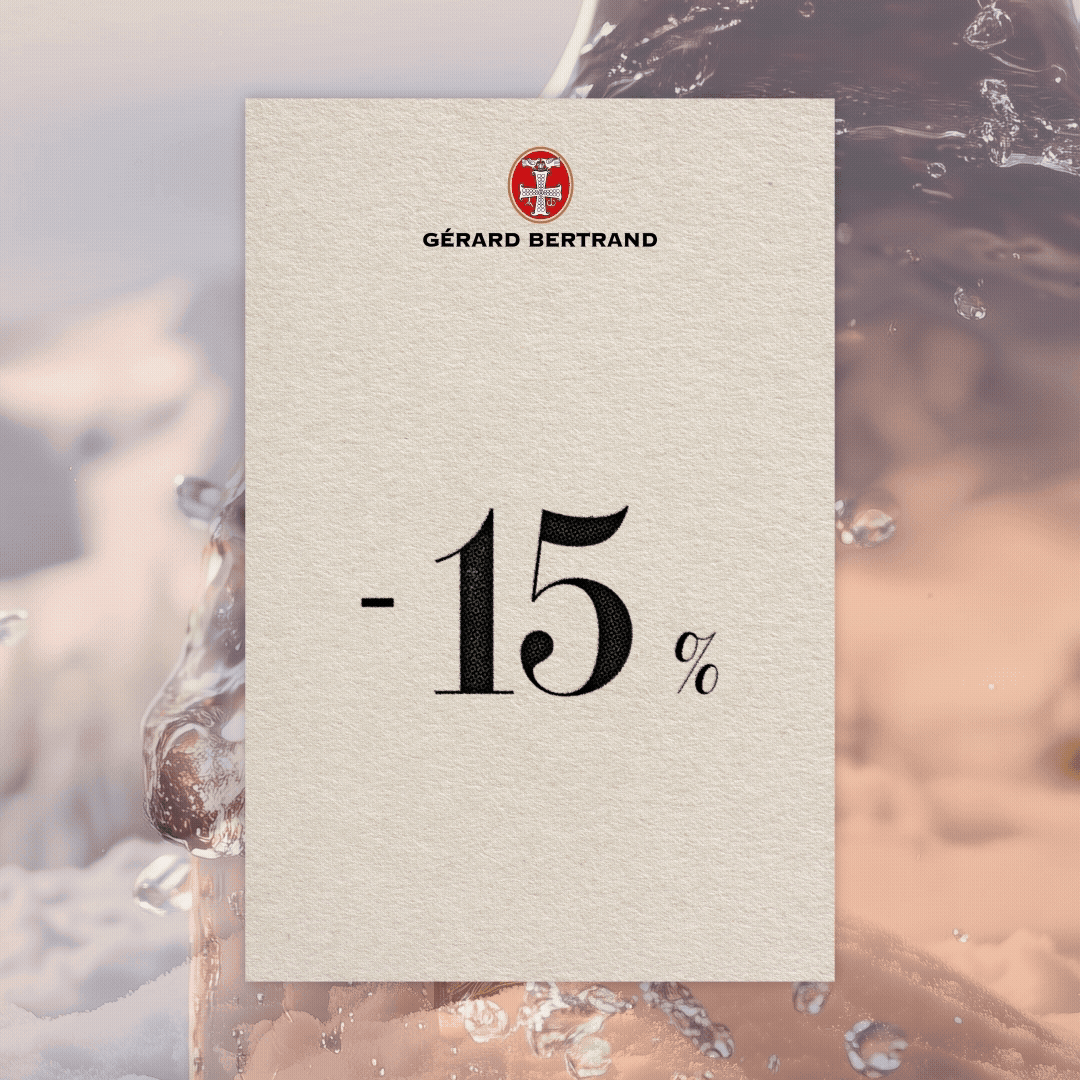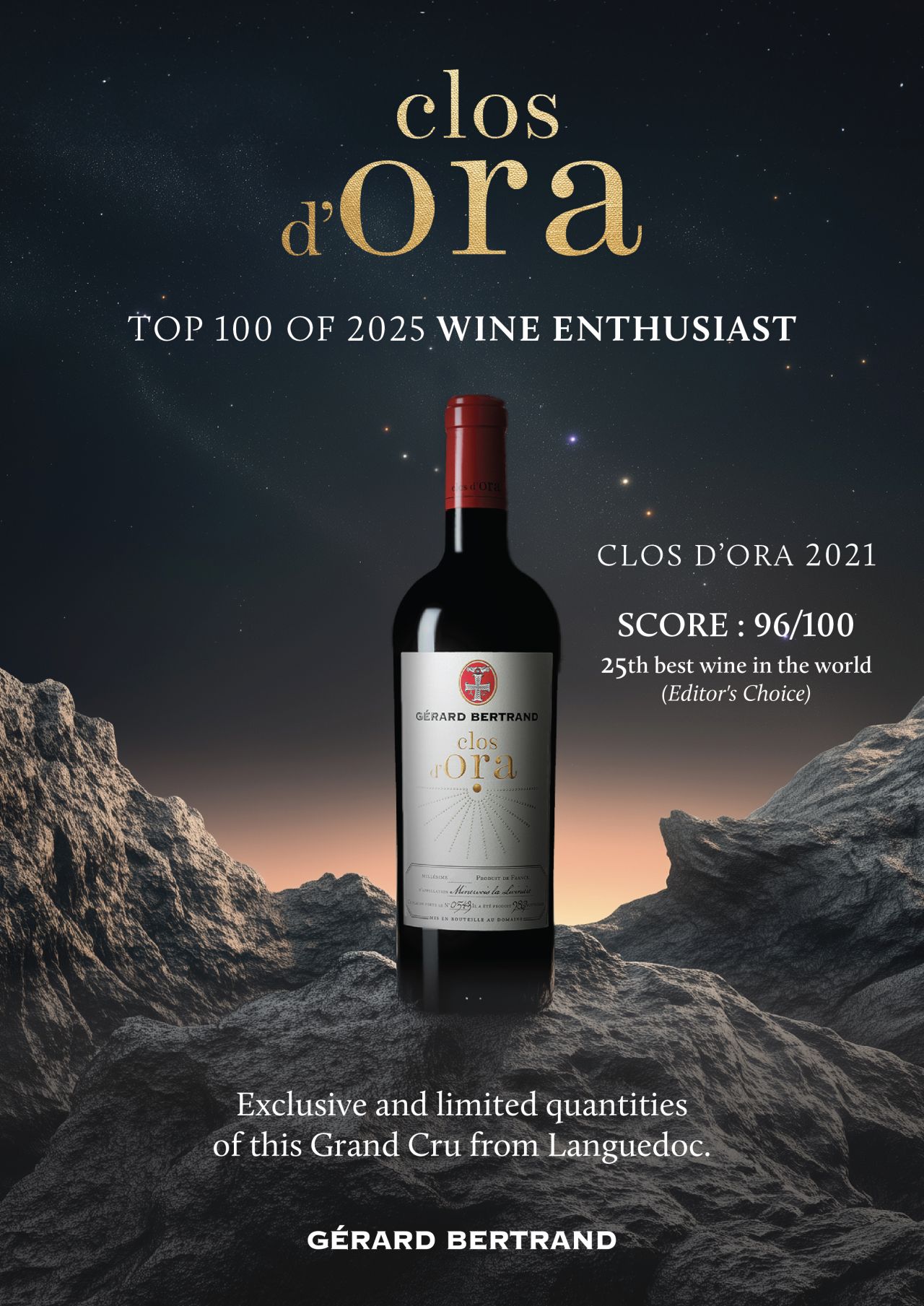Le vin idéal en 4 questions
FAITES LE QUIZZ



Concilier production de vins bio d’excellence et respect de la nature est un engagement fort de la part de Gérard Bertrand. Cet homme de valeur et véritable ambassadeur de la protection de l’environnement est aujourd’hui le leader mondial des vins biologiques.
Au fil des années, Gérard Bertrand a repris 14 domaines répartis sur l’ensemble du Languedoc-Roussillon et les a accompagnés dans leur transition vers un mode de production plus propre. Aujourd’hui, le pari est gagné : la totalité des parcelles de vignes sont à minima labellisées AB, et les vins expriment avec brio le terroir dont ils sont issus.

Un vin bio est un vin conçu selon les principes de l’agriculture biologique, soit une agriculture sans herbicides, sans OGM et autres engrais chimiques. Cela implique pour le vigneron d’appliquer ces principes à l’ensemble du processus de fabrication du vin, de la culture de la vigne (viticulture) à la transformation du raisin en vin (vinification). Un vin biologique est issu de raisins eux-mêmes certifiés biologiques, ainsi que tous les ajouts (les intrants) nécessaires à la bonne transformation du raisin en vin (levures, produit de collage, etc.).
Un vin certifié Bio est ainsi produit à partir de vignes de qualité, selon des pratiques respectueuses de l'environnement. Obtenir le label Bio “AB” nécessite de respecter un cahier des charges stricte établi par l'Union Européenne (Règlement n° 203/2012). Depuis peu, le label CAB (Conversion en Agriculture Biologique) est apparu et permet d’identifier les viticulteurs de la région Occitanie ayant entrepris la démarche de transformer leurs vignes en culture biologique.
Pour s’assurer de la bonne conduite des producteurs Bio, des organismes indépendants agréés par l’INAO (Institut national de l’origine et de la qualité) sont chargés de certifier et de contrôler le respect du cahier des charges du Label. Parmi ces organismes indépendants, citons par exemple, pour les vins bio du Languedoc : Ecocert, Certisud, Qualisud, Alpes Contrôles, etc.
Cependant, pour obtenir un vin de qualité, produire une vigne sans produits chimiques ne fait pas tout. Sans le savoir-faire de l’homme, le jus de raisin se transformerait inévitablement en vinaigre.
C’est ainsi au vigneron, et à l'œnologue, de jouer un rôle prédominant dans la conception d'un vin biologique.
Découvrir toute la gamme et la collection des vins biologiques de Gérard Bertrand.

Comme nous venons de le voir, produire un vin bio c’est être plus écologique, plus à l’écoute de la nature, raison pour laquelle Gérard Bertrand possède aujourd’hui plus de 950 hectares de vignes labellisées AB ou en cours de conversion.
Mais quels sont les avantages d’un vin issu de l’agriculture biologique ? Et quelles sont les différences avec un vin traditionnel ?
Le principal avantage d'un vin biologique de qualité, tout comme un vin biodynamique, est qu’il exprime tout le potentiel du fruit. Le raisin, en étant respecté durant son développement, délivre toutes ses saveurs. Une parcelle de vigne certifiée AB est une garantie d’être en présence d’une vigne ayant reçu une conduite homogène et équilibrée, avec la patience d’une culture qui va dans le sens de la plante, et non dans le sens de la productivité à tout prix. Avec un vin bio, le développement du raisin lui-même est aussi important que le travail effectué par l’homme dans la cave. Mais venons-en au point le plus important, celui du goût !
Il est généralement constaté que les vins bio, quand ils sont de qualités, comme pour les vins du Languedoc Gérard Bertrand, délivrent des saveurs plus fines et plus délicates qu’un vin traditionnel. L’équilibre des saveurs est ainsi remarquable, avec des notes florales très présentes. Une des raisons de cet équilibre est qu’il s’agit d’un vin qui se construit moins sur l’alcool que pour un vin traditionnel.
Une autre caractéristique gustative typique des vins bio du Languedoc est leur exceptionnelle minéralité. C’est notamment ce que l’on remarque pour les vins produits dans les domaines Gérard Bertrand, comme au Château de l’Hospitalet, une propriété exceptionnelle située au cœur du massif de la Clape, un terroir calcaire par excellence.
L'explication à cela est qu’un raisin non traité se concentre nettement plus en oligo-éléments et en minéraux. C’est ce qui permet, lors de la dégustation du vin, de retrouver cette saveur minérale, fraîche, presque saline, notamment pour les vins blancs. Un vin biologique, nous l’avons vu, est un vin élaboré en étant plus proche de l’essentiel, de son fruit et de son terroir. Ces saveurs sont subtiles, équilibrées et révèlent son histoire.
Si nous devions résumer, nous pourrions dire qu’un vin bio ne ment pas, il exprime tout simplement ce qu’il est.
Nous sommes convaincus que l’agriculture biodynamique en harmonie avec la nature est le meilleur chemin pour produire des vins d'excellence de nos terroirs du Sud de la France. C'est pour cela que nous avons débuté la conversion de nos domaines vers l’agriculture biodynamique sur le Domaine de Cigalus en 2002 et que d'ici 2023 l'ensemble des vignobles seront certifiés DEMETER.
En savoir plus sur le vin biodynamie en Languedoc.
Découvrez d’autres types de vin :
Fabrication du vin rosé : comment est-il conçu ?
Et pour en savoir plus sur :
Les vins Gérard Bertrand et son savoir-faire
La biodynamie
Les Châteaux et Domaines de Gérard Bertrand
Ou encore pour nous contacter

Gérard Bertrand et ses équipes ont le plaisir de vous convier à WINE PARIS, l’événement international phare des professionnels du vin et des spiritueux. Du 9 au 11 février 2026 Découvrez un espace ...
Lire l'article
Du 7 janvier au 4 février, profitez des soldes d’hiver pour faire le plein de bonnes affaires et reconstruire votre cave à vin après les repas de fêtes. Pendant toute la période, nous vous proposon...
Lire l'article
Nous sommes fiers d’annoncer que Clos d’Ora 2021 figure 25e dans le top 100 des meilleurs vins au monde selon le Wine Enthusiast, avec une note exceptionnelle de 96/100.Véritable ambassadeur des gr...
Lire l'article